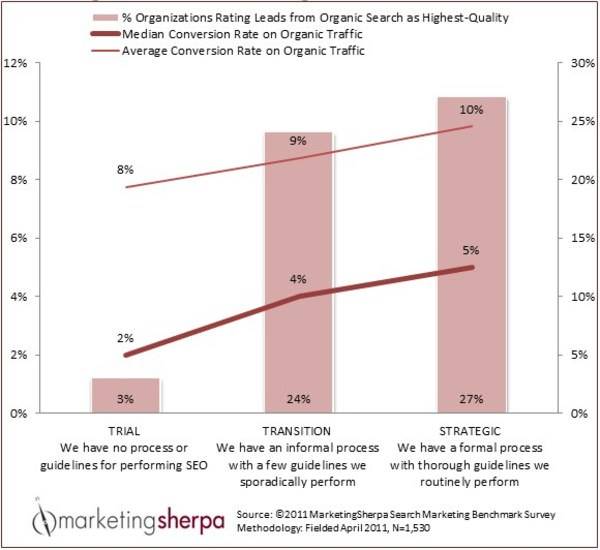If you’re trying to convince the powers that be at your organization that they need formal SEO processes, the folks at MarketingSherpa have your back. According to research analyst Kaci Bower, organizations that have formal processes and good guidelines see big benefits in terms of lead quality and organic traffic conversion rates.

Bower’s post pulls from MarketingSherpa’s 2012 Search Marketing Benchmark Report. The report looks at three phases of SEO maturity: Trial, transition, and strategic. Trial organizations have “no process or guidelines” for SEO, transitional organizations have an informal process that’s sporadically followed, and strategic orgs have formal processes that are routinely performed.
Strategic organizations convert a whopping 150% more traffic than the trial organizations, says Bower, and 25% more than transition organizations. Strategic orgs also get more leads in general. Bower reports that one in four strategic organizations say that leads from natural search are of the highest quality, versus just one in 33 for the trial organizations. The flip side is that trial and transitional organizations say that they’re still sorting through lousy leads, with 16% of trial and 11% of transition orgs saying they deal with low-quality leads. Lesson? Go big or go home if you’re dipping your toes in SEO waters.

The free version of the report has a few more insights that are worth noting. For instance, once again, the survey shows that content is king. MarketingSherpa found that content creation was the most effective – but also one of the most difficult activities for companies to undertake. What’s considered “effective” content? Webinars and whitepapers were leading examples, with 46% of marketers surveyed rating Webinars as effective and 40% rating whitepapers effective. They were rated very difficult to produce, however.
Looking for effective but less difficult SEO tactics? Title tags and meta description tags were rated almost as effective as content creation, but rated much less difficult.





















